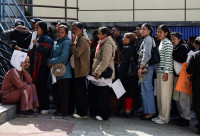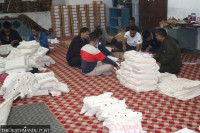National
Nepali queer couples in live-in relationships battle social stigma
They are often compelled to hide their relationship and lie to their homeowners and neighbours that they are either siblings or friends. Of late, things have changed for the better, however.
Manushree Mahat
When 24-year-old Samjhana Bishwakarma and her partner Jeshika Gautam sought to rent a place, they were rejected at the last moment when the homeowner knew about their sexual orientation. Everything was all but decided but then the homeowner became dodgy and they eventually had to find a new place to live in. “It was disheartening,” Bishwakarma says.
Bishwakarma identifies herself as a lesbian woman, and her partner a masculine lesbian. They’ve been together for six years and have been living together in their current residence for three years. Their current homeowners know well about their relationship, and are accommodating of them. Despite the occasional weird looks, they have little to worry about. “It has been very fulfilling staying at this place because of everybody’s acceptance,” Bishwakarma says.
Though Nepal is considered relatively progressive when it comes to queer rights, people from the queer community in the country are still subjected to prejudices and discrimination. And as a result, finding a place to rent can be an uphill battle, as it was for Bishwakarma and Gautam. They are often compelled to hide their relationship and lie to their homeowners and neighbours that they are either siblings or friends.
So did 55-year-old Shila Gurung and his partner Sita Rana. In the beginning, they told their homeowners and neighbours that they were close friends living together. They reside in Nepalgunj, and have been living together for years now. Gurung is a transgender man.
“After we came into contact with queer organisations and queer friends from all over Nepal, we gradually started to feel safe enough to embrace our relationship in society,” Gurung says. Things are starting to become better when it comes to accepting queerness and queer relationships, but acceptance from everybody fully is something that will definitely take time, Gurung adds.
Recently, Nepal saw a few groundbreaking developments that guaranteed equal rights to gender and sexual minorities in the country. In June 2023, the Supreme Court ordered the registration of same-sex and non-heterosexual marriage and in November of the same year, Maya Gurung and Surendra Pandey became the first same-sex couple to register their marriage in South Asia.
But the road to reach this point has been difficult for the community, and it still is on various fronts. In Surendra and Maya’s case, too, familial acceptance was lacking, and it took them years to register their marriage. Many queer couples in a live-in relationship hope to eventually get married and have their marriage legally registered, but despite existing laws, implementation remains subpar.
Article 15 of the constitution forbids discrimination against anyone based on gender and sexual orientation. However, Bimala Gurung, programme coordinator at Mitini Nepal, says that prejudice against queer couples has manifested in many ways, and one of them is mistreatment by homeowners.
“Sometimes, homeowners indirectly force their queer tenants to leave by stopping their fair supply of water or electricity,” Gurung says.
Meanwhile, many queer couples choose to flee their homes when their family members refuse to accept them. In July last year, the Post reported that a young couple eloped together when one side of the family was adamantly homophobic. In another similar story, a lesbian couple, Pabitra Badi Nepali and Bimala BK, ran away at a young age to live together due to persistent familial pressure to split, and marry others. When they returned home with the intention of building a life together in their village, they were shunned and ridiculed by their villagers.
In a society that resists queer romantic relationships, it is essential to create safe spaces for queer couples to live their life the way they want, experts say. Normalising queer live-in relationships and marriages is one step towards attaining that goal, they add.
Twenty-three-year-old Sarita Ruchal and her partner had to be initially cautious of living together because of unsolicited questions directed towards her partner, who is a transgender man. When people would hear her partner talking, they would question his sexuality. They would tell him that he had a woman’s voice, while asking the couple how two women could live together. This was when they resided in Baneshwar, Kathmandu.
Things have changed for the better, however. At their new place in Bauddha, their homeowner is entirely accepting of their relationship, and so are their neighbours. And the couple no longer feel the need to hide their relationship.
“I think Nepali society has made some progress in accepting people from queer communities and queer relationships,” says Ruchal. “I am incredibly happy at my new place. We feel safe here.”
Gurung, programme coordinator at Mitini Nepal, also agrees that increased awareness in urban areas has made people more empathetic towards the community. However, the concept of gender binary that believes romantic, sexual and marital relationships only occur between the opposite sexes is instilled in the fabric of society, she added.
Experts suggest that to properly monitor instances of discrimination against queer communities—including mistreatment by homeowners—keeping a database of the number of queer couples in a particular ward and provinces could be valuable. Filing a police complaint could be an option to seek justice for those couples who were shunned by their families for their relationship, but that step may be long and difficult for the couples themselves.
Queer individuals often seek counselling to combat the social discrimination they face on a daily basis, Gurung says. “Awareness is increasing,” she says. “But there still needs to be better work on the part of stakeholders and service providers for queer couples to enjoy their free will as any heterosexual couples.”




 20.9°C Kathmandu
20.9°C Kathmandu














